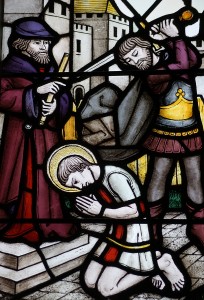Today’s Gospel is one in which we need to look at what Jesus said, in light of when this Gospel was written. Never forget that the last line of the Gospel of John explains that very little of what Jesus did and said is actually included in the gospel. A vast immeasurable majority is not included in this narrative at all. This leads us to ask the question, why is this here and not part of the excluded elements of the gospel. The answer to this question can be seen in the time it was written.
The gospels are not eyewitness accounts as you might see in a newspaper report. They are accounts that were first handed down through gatherings not unlike what happens at mass and prayer meetings, though most likely more in secret. So the obvious question to be asked is what was happening at the time that would indicate the need to include this passage from Jesus. The answer can be seen in the reality of the first centuries of Christianity, a time of great persecutions of varying degrees. They extend from the tyrannical and evil actions of such Roman Emperors as Nero who ruling for fourteen years turned Christians into a horrible scapegoat and is believed to have used the burning of them as a source of light for his parties.
Choosing to be a Christian was a gross danger, not unlike its reality in places like China and Vietnam today. Therefore, such words would be included at the time of the final edit of the Gospel of John, in the late First Century as a source of comfort. Keep the faith, trust that you are seeking the truth. In time, of course, in the fourth century AD Christianity was legalized throughout the empire and such terror under which Christians lived would no longer be part of the environment. Yet, the words remain.
They remain for us and like them they are reminders of whom it is we are following and why.
This reading comes at a unique time. As I was writing this homily this week, there was little doubt that I would deliver it. This despite that, in this country [USA], there are those who said that Jesus was supposed to return yesterday. I had no doubt that I had to be more concerned about preparing to deliver my homily today, than meet my maker yesterday.
However, earlier in the week, scientist Stephen Hawkings said that Heaven is a fantasy. I do not consider him right on this issue, although Pope John Paul the second reminded us that Heaven is not a place but a state of being.
In either case, Jesus’ words to not let our hearts be troubled can center on avoiding making our decisions based on a belief that there is no God or that Jesus is not the messiah. If in fact, God did not exist, then we should let our hearts be troubled, for we are alone in a harsh universe, that may be spectacular in the world of Stephen Hawkings, but is also meaningless and cold.
Jesus reminds us that such a poor assumption is wrong. Have faith in Him and in doing so make all your decisions based on His words and His relationship with us. Then when those who do not believe are left to their own fears and passions, we are instead living in a way that leads us to act differently. We have been commanded to trust in God at all times and to know His presence even when we fear we are approaching dark or difficult times. This reality was a powerful tool of spreading the gospel, when Christians acted in unexpected ways as they faced great tribulations.
Many of the saints approached their own martyrdom with courage and not
fear, for they trusted in the Lord.
What is it that leads our heart to be troubled? Are you afraid of losing your job, are you afraid of going broke or of a disease, or of death or of something else? But Jesus tells us not to let our hearts be troubled. We are to face those uncertainties with our feet on the ground of holiness trusting that God is with us every step of the way.
Padre Pio said that if you are in fear, you need to draw closer to God and even indicated that our fears were signs that we are not as close to God as we should be.
Jesus said “Do not let your hearts be troubled” that is a command and it means exactly what it says.
We need to walk every step of the way in faith and trust in God at all times. We will get through our difficulties, we will survive.
Have faith in God and have faith in Jesus. You have faith when you choose to do His will and follow His commandments, but there is a benefit to that action and that is the ability to trust in God at all times, especially in the toughest of times.
The people of the early centuries had a serious choice to make. Attending mass could be considered a crime punishable by the most tortuous of deaths. Yet, they still chose Christ over living outside of his favor, never out of fear but out of trust, that they had found the messiah. We don’t have the same threat hanging over our heads, but we have other difficulties and we need to address in two ways, one by always seeking Christ and the second by always trusting him more and more.
Psalm 146:10 says Be still and know the I am God. Jesus says Do not let your hearts be troubled. Paul says dismiss all anxiety from your mind. In each case, the message is simple, the depth of discipleship in Jesus can be measured in how much we trust and how little we fear.
God bless you,
Fr. Robert J Carr
Fr. Carr is an alliance member of the New Song Community (Canção Nova). He is the pastor of St. Benedict Parish in Somerville, MA and is the editor of this blog. You may also find his videos in English at Gloria.tv. He also has a regular radio program on WebRadio Canção Nova. Which he podcasts on the Canção Nova podcast website and here on Catholicismanew.




